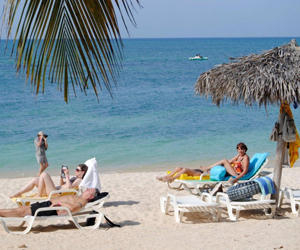Americans traveling to Cuba in record numbers
- Submitted by: lena campos
- Travel and Tourism
- 10 / 20 / 2013

Americans are visiting Cuba in record numbers despite strict travel restrictions, joining the hundreds of thousands of Cuban Americans who travel home each year, according to Cuban government figures published on Friday.
Just over 98,000 U.S. citizens visited Cuba in 2012, up from 73,500 in 2011 and twice the number compared with five years ago, according to an online report by the National Statistics Office (www.one.cu).
The numbers do not include more than 350,000 Cuban Americans estimated by travel agents and U.S. diplomats to have visited the island last year. Because Cuba considers them nationals, they are not listed in its tourism statistics.
U.S. citizens are barred from traveling to Cuba without government permission under a U.S. trade embargo imposed half a century ago that can only be lifted by Congress.
The rise in U.S. visitors partly reflects a loosening of travel restrictions by President Barack Obama's administration and allow "people-to-people" contact aimed at speeding political change on the communist-ruled island 90 miles from Florida.
As well as allowing Cuban Americans to travel to Cuba freely, Obama authorized licenses for "purposeful" travel to more than 250 Cuba travel agents and allowed more airports to provide charter service between the two countries.
The program, which began in 2011 and requires annual renewal of permission to bring groups to Cuba, allows for educational and cultural travel. The regulations require detailed itineraries of each traveling group.
Cuba hosted 2.8 million tourists in 2012, with arrivals down 2 percent so far this year.
"Cuba has so much to offer in terms of culture, history and issues of mutual concern - healthcare, education and the environment - and students, professionals, people of faith are curious," said Collin Laverty, head of travel provider Cuba Educational Travel.
In the years following Cuba's 1959 revolution when Fidel Castro took power, the highest known number of U.S. visitors peaked at 70,000 under President Bill Clinton, but dropped to an average of 30,000 in the last term of President George W. Bush.
Travel to Cuba is seen as a key political issue by both embargo supporters and opponents in Washington.
"This is not about promoting democracy and freedom in Cuba. This is nothing more than tourism ... a source of millions of dollars in the hands of the Castro government that they use to oppress the Cuban people," Republican Senator Marco Rubio of Florida told a congressional hearing soon after Obama instituted the policy.
Theodore Piccone, deputy director of foreign policy at the Washington-based Brookings Institute that advocates engagement, said Obama should do more to open travel to Cuba. He said it was ironic that Cubans, due to reforms on the island, were now free to travel where they pleased while U.S. citizens were not.
"American travel to Cuba will remain a small fraction of its potential as long as President Obama avoids a further liberalization of travel," he said. "If the Cuban government can open travel of its citizens, which it now has, why can't we?"
Source: Chicago Tribune.com
Comments